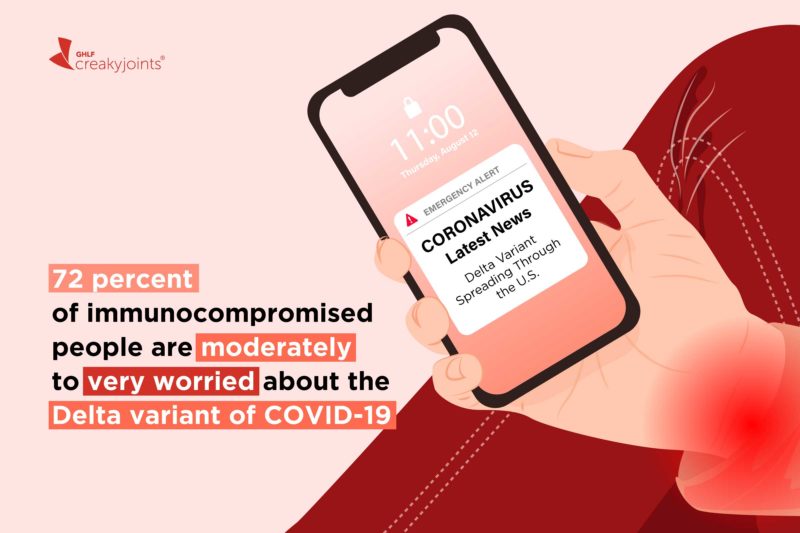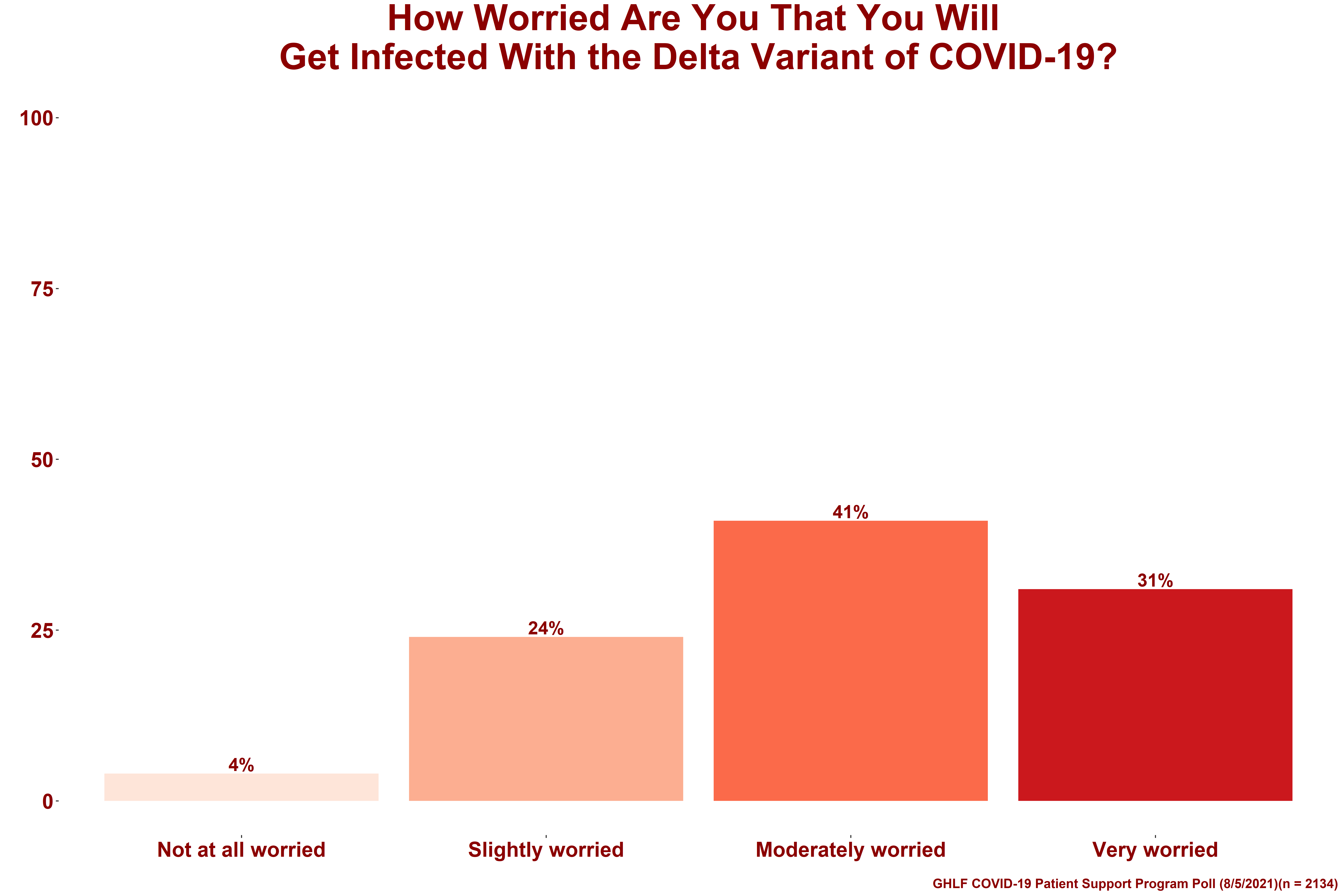Learn more about our FREE COVID-19 Patient Support Program for chronic illness patients and their loved ones.
It seems like only yesterday the U.S. Centers for Disease Control and Prevention (CDC) announced that fully vaccinated people could, by and large, resume all outdoor and indoor activities without wearing a mask or physically distancing. But if we’ve learned anything from the COVID-19 pandemic, it’s that things can change in an instant. In July, two months after changing its guidance for fully vaccinated people, the CDC updated its recommendations once again.
In short, the CDC’s updated recommendations state that fully vaccinated people should wear a mask in public, indoor settings in areas of substantial or high transmission, as well as if they or someone in their household is immunocompromised or at increased risk for severe disease from COVID-19.
The reason for the stricter recommendations: the Delta variant (and the fact that stalled vaccination rates in the U.S. are allowing it to spread widely and rapidly). First identified in India, the Delta variant is much more transmissible than previous strains of the coronavirus. Case in point: According to the CDC, the Delta variant accounted for 1.3 percent of COVID-19 cases in May 2021. But by the end of July 2021, it accounted for 83 percent of cases.
Recent research shows that people with inflammatory and autoimmune conditions who take immunosuppressant medications have a slightly lower response to the COVID-19 vaccine than others. (This, however, is largely dependent on which specific immunosuppressant medications you take.) Additionally, preliminary research indicates that people who are immunocompromised are more likely to experience breakthrough infections (which are likely caused by the Delta variant) than those who are not. A breakthrough infection, according to the CDC, is, the detection of SARS-CoV-2 or antigen in a respiratory specimen from a person 14 days or more after receiving of all recommended doses of FDA-authorized COVID-19 vaccines.
So, it’s no surprise that people who are immunocompromised are worried about the Delta variant and changing their lives, once again, to protect themselves against it.
A recent poll of 2,137 people, conducted by the Global Healthy Living Foundation (GHLF) as part of its COVID-19 Patient Support Program, aimed to gain insight into how concerned immunocompromised people are about the Delta variant and if the surge in COVID cases has changed their mitigation efforts or activity choices. Of those surveyed, 95 percent said they are fully vaccinated.
Here are some key learnings and insights from the poll.
Many immunocompromised people are worried about the Delta variant, despite their vaccine status and mitigation efforts.
As part of the poll, patients were asked to rate how worried they were about getting infected with the Delta variant of COVID-19. Of the 2,134 who answered:
- 4% said they were not at all worried
- 24% said they were slightly worried
- 41% said they were moderately worried
- 31% said they were very worried
But immunocompromised patients aren’t just worried. In a free response section of the poll, many people shared the emotions they have been experiencing since the Delta variant was identified and the number of COVID-19 cases started to spike again.
“I feel sad, scared, and a little bit angry,” one person shared. “I wish everyone would listen to doctors and scientists, and get vaccinated.”
Another person also wrote that they were “angry and sad because the rise in cases is completely preventable due to the availability of vaccine.”
“I’m finding it hard to deal with unmet expectations I had of life going back to ‘normal,’” one person shared. “It feels like we’re going backwards, and it makes me sad.”
“I am concerned that the country is headed to dark days again and it makes me sad as well as angry,” another person wrote. “I am angry that those of us at highest risk, who have done everything to keep ourselves and our loved ones safe, are now once again at risk.”
Most immunocompromised people are wearing masks in indoor settings, as well as some outdoor ones.
Throughout the pandemic, immunocompromised people have been extra cautious due to the limited research into how COVID-19 affects people with compromised immune systems. This has meant staying home as much as possible, avoiding loved ones who aren’t fully vaccinated or not practicing mitigation efforts, and wearing a mask outside of the home.
Though some immunocompromised people were starting to feel comfortable forgoing a mask in certain situations, our poll shows this changed when COVID cases began to rise again and the Delta variant began to spread.
In the survey, we asked participants if they had worn masks in various scenarios since COVID cases began to surge in July 2021. For each scenario, they were able to choose one of four responses:
- Yes, I’ve worn a mask for this activity since the rise of COVID-19 cases
- No, I have not worn a mask for this activity since the rise of COVID-19 cases
- I’ve never worn a mask for this activity
- I haven’t done this activity since before the pandemic
When it comes to large indoor events, such as games, concerts, and weddings, 42 percent of respondents said they had not participated in the event since before the pandemic. Of those who had participated, 85 percent said they’ve worn a mask since the recent rise in COVID-19 cases.
The responses were similar for large events that took place outside. Again, there were several respondents (40 percent) said they had not participated in the event since before the pandemic. Of those who had participated, 61 percent said they’ve worn a mask since the recent rise in COVID-19 cases.
Immunocompromised people are wearing masks around unvaccinated loved ones.
Another scenario in which wearing a mask became more commonplace since June 2021: being around unvaccinated loved ones.
When it comes to socializing indoors with unvaccinated family and friends, 32 percent of respondents said they had not done that since before the pandemic. Of those who had, 68 percent said they’ve worn a mask since the recent rise in COVID-19 cases.
As far as socializing outdoors with unvaccinated family and friends, 24 percent of respondents said they had not done that since before the pandemic. Of those who had, 55 percent said they’ve worn a mask since the recent rise in COVID-19 cases.
Many immunocompromised people have stopped participating in certain activities that were just starting to feel comfortable again.
We asked respondents if they were still comfortable doing certain activities, given the Delta variant. There were some activities — using public transit, traveling on an airplane, and traveling out of the country — that the majority of participants (75 percent or more) had not done since before the pandemic. There were several other activities, however, that many participants had resumed until the Delta variant changed things again.
When it came to dining indoors at a restaurant, 45 percent of respondents said they had not done that since before the pandemic. Of those who had, 56 percent said they had been doing so but stopped due to Delta variant concerns.
Participants felt similarly about attending indoor public events: 61 percent of those who had been doing so stopped due to Delta variant concerns.
There’s no telling when the Delta variant will stop spreading or when COVID-19 cases will start to subside. But this isn’t the only unknown impacting people with a compromised immune system. There is still little information into how COVID-19 — and the variants — affect immunocompromised individuals. And until there’s more data and guidance becomes, many immunocompromised people find it easier and (slightly) less stressful to resume isolating, masking, and social distancing, our poll shows.
“As someone with an autoimmune disease, I never stopped wearing a mask and now with Delta, I feel stuck at home again,” one person wrote.
Another person echoed these thoughts, sharing that “I started to socialize again (with a mask) but now I will begin isolating except for groceries and needed doctor appointments.”
“It feels impossible to do the daily calculations to figure out what is reasonably safe with masks and what is not,” another person shared. “It’s bad enough being chronically ill without having to constantly assess risk and then justify my conclusions to everyone else I interact with, most of whom are vaccinated people not following Delta as closely or taking it as seriously because they believe they are protected.”
“I was so happy when vaccines came out and cases went way down that I ventured out of my home, and even went to Hawaii,” one person wrote. “Now, I’m scared to leave my house. I feel like I will never have a life again.”
The Global Healthy Living Foundation is committed to providing ongoing education about COVID-19 vaccines for the chronic illness and immunocompromised community.
To stay informed about the latest COVID-19 vaccine news for people who are immunocompromised, take immunosuppressant medications, or have autoimmune conditions, follow all of our COVID-19 vaccine coverage here.
Get Free Coronavirus Support for Chronic Illness Patients
Join the Global Healthy Living Foundation’s free COVID-19 Support Program for chronic illness patients and their families. We will be providing updated information, community support, and other resources tailored specifically to your health and safety.
About the Patient Support Program Quick Poll
Members of our program have underlying health issues — such as inflammatory arthritis and other autoimmune conditions, heart disease, lung disease, diabetes, and more — that may increase their risk for COVID-19 complications. They are interested in understanding the best ways to stay safe during the pandemic and to be part of a community of people with similar concerns, questions, and fears.
We regularly poll members, who live in the U.S. as well as around the globe, about a variety of topics, including how the pandemic is affecting their lifestyle, mental health, chronic disease management, medication adherence, and more.
We use this information to inform the educational resources we provide and to inform other stakeholders — such as public health experts, policymakers, advocacy groups, health care professionals, and pharmaceutical companies — about chronic illness patients’ needs and concerns. You can participate in ongoing polls by joining the support program here.
COVID-19 Vaccine Breakthrough Infections Reported to CDC — United States, January 1–April 30, 2021. Morbidity and Mortality Weekly Report. U.S. Centers for Disease Control and Prevention. May 28, 2021. https://www.cdc.gov/mmwr/volumes/70/wr/mm7021e3.htm.
COVID Data Tracker. U.S. Centers for Disease Control and Prevention. August 10, 2021. https://covid.cdc.gov/covid-data-tracker/#variant-proportions.
Interim Public Health Recommendations for Fully Vaccinated People. COVID-19. U.S. Centers for Disease Control and Prevention. July 28, 2021. https://www.cdc.gov/coronavirus/2019-ncov/vaccines/fully-vaccinated-guidance.html.









